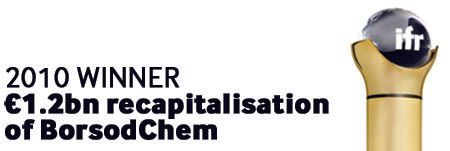EMEA Restructuring
Sino-Hungarian chemistry: When Hungary’s leading chemicals company faced financial difficulties, few expected a Chinese trade player would become the major investor in the business. Wanhua’s proactive stance, taking a critical position in the capital structure of the distressed group, makes its €1.2bn recapitalisation of BorsodChem IFR’s EMEA Restructuring of the Year.

When BorsodChem warned lenders it was likely to breach covenants in March 2009, the Hungarian chemicals company’s options looked limited.
The business’s €1.6bn buyout by Permira and VCP in late 2006 had laden the business with €750m of debt. Shrinking earnings had pushed leverage from 5.3 times Ebitda to nearer 20 times two years later. BorsodChem was also in the middle of a major project to expand its TDI plant. In all, the group needed €100m to keep trading in the short term.
Using the more dazzling tricks in the restructuring toolbox, such as shifting the company’s centre of main interest to a more forgiving jurisdiction such as the UK, was politically impossible: the government had agreed that September to put in the €100m required via a loan, as part of a wider compromise agreement. The beleaguered Hungarian government made clear it wanted to protect BorsodChem’s 3,000 workers.
The equity owners and senior lenders faced an insolvency process under the untested Hungarian regime unless they could reach a consensual agreement. But the chances of any neat restructuring solution looked remote. Two Hong Kong-based hedge funds were reported to be taking stakes in the mezzanine, previously thought deeply out-of-the-money. That was the seed that hatched Wanhua’s plan to take effective control of BorsodChem.
The Chinese company, majority owned by a state investor, had been considering expanding in Europe by developing a greenfield site or buying a healthy business. But BorsodChem’s stressed balance sheet offered an opportunity to buy a sizeable player at a relatively low price.
Wanhua’s position was delicate. It did not want to appear mercenary. But by the time its related funds had taken the mezzanine position, an alternative plan leaving Permira in control was outlined. This plan gained support from the senior lenders, who received better terms for extending the existing loan. Moreover it was underwritten by the Hungarian government.
“It was very sensitive. All stakeholders were under pressure and the deal, which was not conventional, was discussed at the highest levels by the respective governments,” said one person involved.
Wanhua’s move changed the course of events. The funds proceeded to buy up all the outstanding mezzanine in the market. The price of the senior debt had been quoted at less than 30 cents in the euro soon after BorsodChem sought its initial loan waiver in March. It recovered to trade at 80 by the close of the restructuring the following June.
One surprising aspect of the fresh deal was that, not only did the senior loans remain unimpaired, the sponsor retained majority control at 52%. Permira had completely written off the investment the previous year.
Superficially Wanhua’s outcome looks less satisfactory. Building a pivotal position in the mezzanine pushed up the prices of all other stakes in the structure. That added to the costs of acquiring the business, in which it ended up with only a 38% interim interest. But valuation was less of an issue in this situation than other factors.
The Chinese company would have been unlikely to have been welcomed by a Hungarian court if it had tried to buy the business cheaply from the receivers. By ensuring it was at the negotiating table, via its mezzanine holding, Wanhua could gradually convince other stakeholders of the value it could bring to the business.
The business’s financial health remained precarious throughout negotiations. Wanhua injected €30m of funds at one stage to keep the deal on track and prevent bankruptcy, which would have ruined the consensual plan. That gave it more than 10% of the senior debt.
Wanhua’s agreement not to take majority control of the business straight away prevented senior lenders from claiming full repayment on the change of control of the business. Many were keen to do so if the Chinese buyer gained a majority of the equity. That group was also exploring sale options in case Wanhua’s proposal fell through.
Wanhua’s accompanying call option ensures it will take full control at the appropriate moment and refinance the business with Chinese lenders. This elegant solution ensured 100% of senior lenders agreed to the deal.
Houlihan Lokey and Morgan Stanley advised the company. Sequor Partners and Bank of America Merrill Lynch acted for Wanhua. DC Advisory Partners advised the senior lenders and Deutsche Bank worked for the Hungarian government.
Christopher Spink





